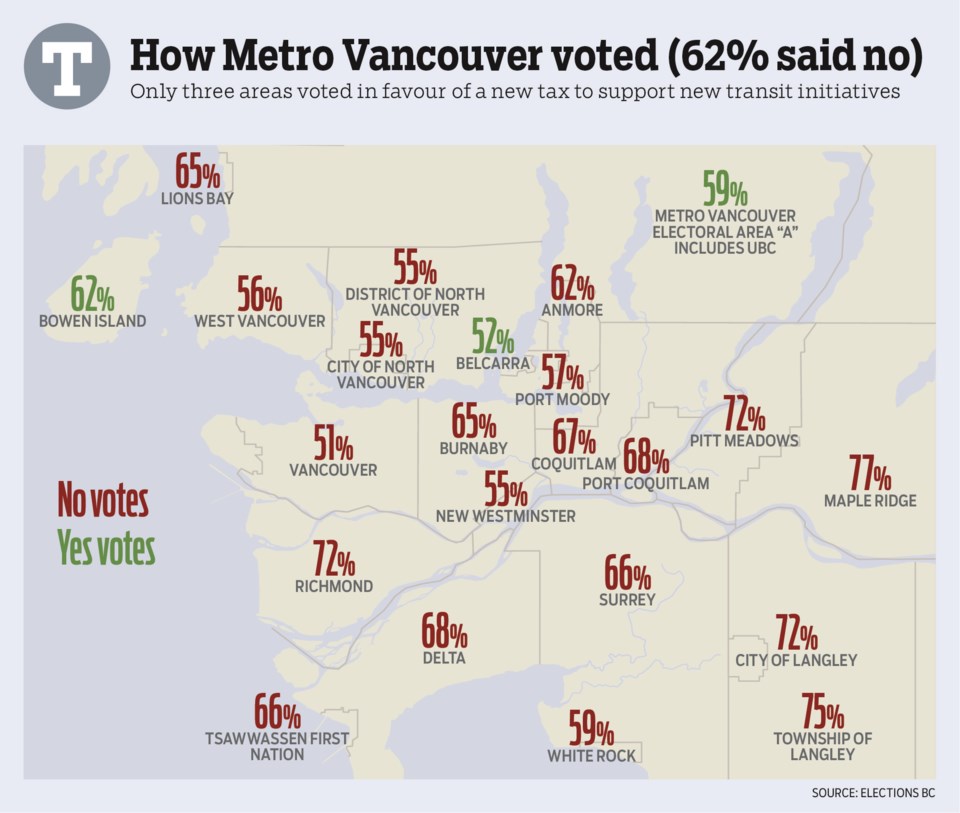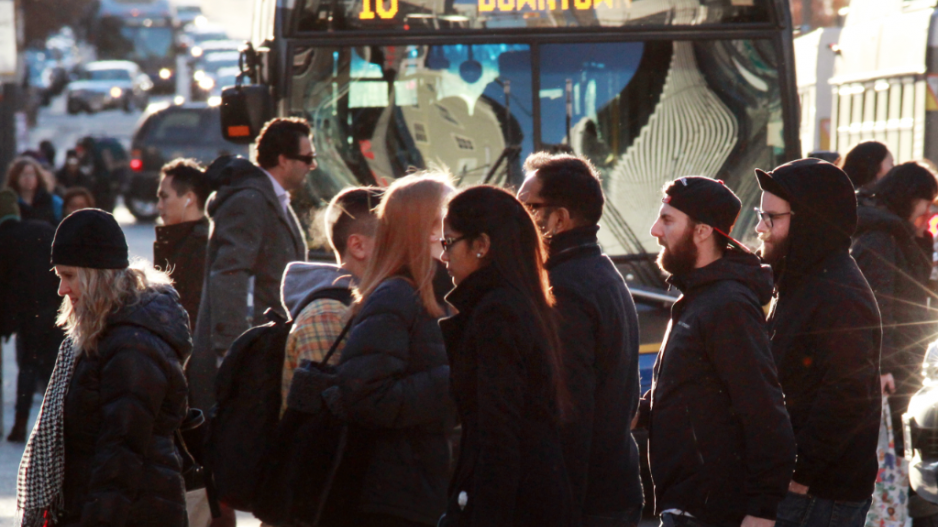TransLink’s Mayors’ Council is stuck at a red light after its contentious plan to raise $250 million a year for Lower Mainland transportation infrastructure was voted down by local residents.
The no side drew 62% of votes compared with the yes side’s 38%, according to results released Thursday morning (July 2).
Metro Vancouver residents had been asked whether they would support a regional 0.5% sales tax to pay for local government’s share of $7.5 billion to expand transit.
That money would have raised $250 million a year to go towards capital projects and operations. To proceed, the plan would still have needed funding commitments from the province and federal governments.
Jon Garson, vice-president of the B.C. Chamber of Commerce, said there are concerns within the business community that municipalities will begin competing with one another for funding if there is no regional plan.
“We’ll have to look at how we’ll move forward now. We don’t have a new funding mechanism, which means no new money going into the system,” he told Business in Vancouver.
“It’s something that’s going to hold back our economy and hold back our ability to create jobs because of the traffic congestion and the increasing number of people coming to the region are not going to go away in the face of a no vote."
Garson added business investment throughout the region would suffer without an immediate commitment to transportation funding.
“It’s not that we will stand still in that time. We will move backwards,” he said.
The plan, which was created by TransLink’s Mayors’ Council, included a new light rail system for Surrey, a subway along part of Vancouver’s Broadway corridor and a new Pattullo bridge. Parts of the plan also included more buses and road, pedestrian and cycling improvements.
Keith Sashaw, president of the Association of Consulting Engineering Companies, said it appears the plebiscite turned out to be more of an indictment over TransLink’s governance rather than transportation investment.
“Certainly, we’re disappointed,” he said.
“Even as employers, what we’re hearing from our members is that their employees are asking for better transit. We’re seeing some of our firms deliberately move to transportation nodes so that their employees can get to work quicker and easier and less stress than fighting traffic.”
He said it is imperative for the province and TransLink to move forward quickly in terms of finding a plan B to develop the Mayors’ Council’s proposal.
But Vancouver Mayor Gregor Robertson told reporters there is no plan B.
“The mayors have been unanimous in stating that property tax is not an option to fund the mayors’ plan. Going forward, we need an alternate solution from the government,” he said.
"Ultimately, it's up to the province to decide how the funding gap is met. They need to empower the region with the tools to raise the funding to improve our transportation network."
However, Transportation Minister Todd Stone said it was up to mayors to go back to the drawing board to figure out how they would fund the plan.
“If it’s not a regional sales tax, it will have to be another funding source,” he said.
While there is a 3% annual cap on property tax increases that TransLink could collect, Stone said the Mayors’ Council has the power to override that cap.
The transportation minister said reallocating funds from the province’s carbon tax would be more complex than introducing a regional sales tax. He added the government is set on keeping the carbon tax revenue-neutral, meaning any increases would have to be offset with reductions in other taxes.
Those campaigning for the yes side included most of the region’s mayors and a coalition of business groups, unions, environmental organizations, social service agencies and student groups. The yes side argued the funds were sorely needed to prevent traffic congestion and reduce pollution as the region adds an expected one million more residents over the next 30 years.
The no side, headed by Jordan Bateman of the Canadian Taxpayers Federation, said the money needed for more transit could be found by cutting municipal spending.
The Mayors’ Council and the B.C. government had been in a deadlock over transit funding and governance for years, with the B.C. government rejecting a proposed vehicle levy; the mayors unwilling to raise property taxes for transit; and the TransLink commissioner rejecting a proposed fare increase.
Like Sashaw, Garson said the campaign focused more on TransLink governance than transportation infrastructure.
“It’s time for us to have a slightly more grown up conversation around this and actually look at how we can move the region forward and how we can make these investments with a million people on their way to the region,” he said.
TransLink interim CEO Doug Allen said in a release convincing Lower Mainland residents to vote in favour of a tax increase was a “tough sell” even if they’re benefitting from transit and transportation infrastructure improvements.
“With no new funding, we will have no capacity to expand the transit system or provide increased service. Costs and customer demand will rise at a time when funding is essentially frozen. As a result, current service levels may be affected and we could face tough decisions in the weeks and months ahead,” he said.
“The need for funding has not gone away and we expect that the search for an acceptable source of regional funding will continue. In the months ahead, we will work with the province, the Mayors’ Council, our customers and the public to find a way to fund much-needed transit for our rapidly growing region.”
Bateman told reporters TransLink is an organization still in denial over the results.
“It almost boggles the mind how the management of TransLink has been so obstinate in going out in this campaign the same way they came in: pretending like everything is alright,” he said.
“The people have spoken. They want TransLink fixed. That is job one. Other things regarding funding increases and taxes and whatnot, those are all reasons why people voted no.”

-With files from Elizabeth Lu, Vancouver Courier




